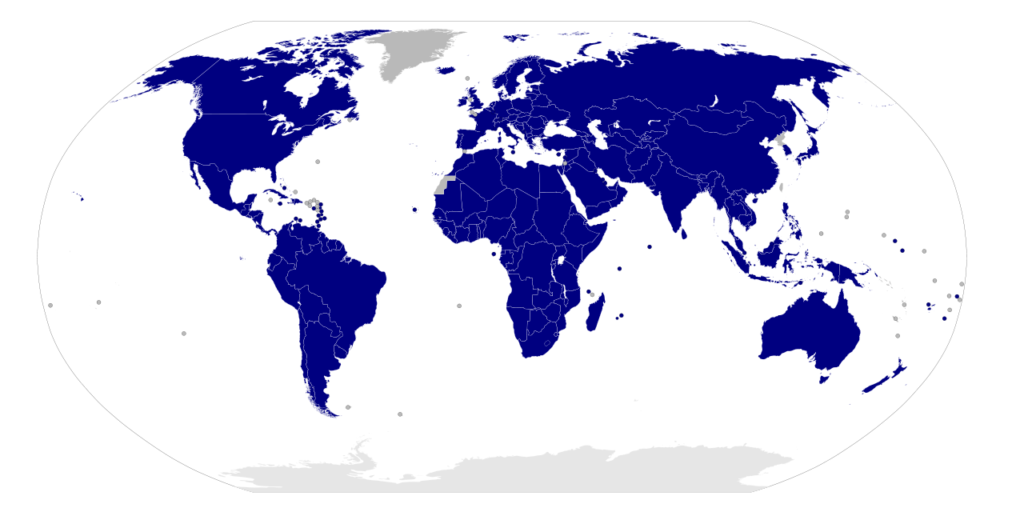
*[This story has been updated, see below for the results of the vote.]
Early last month, the world learned the president of the International Criminal Police Organization – Interpol’s Meng Hongwei “mysteriously disappeared” after traveling home to his native country China after Meng’s wife reported to the French authorities she had not heard from her husband since he left the Lyon-based international police headquarters for a scheduled trip to China on Sept 29.
Eyes of the International community turned to China for answers as Interpol “made a formal request to China for information about the agency’s missing president.”
Thirty-six hours later an announcement appeared on the Chinese Communist Party (CCP) website from the National People’s Republic of China Central Discipline Inspection Commission accusing Meng of “violating the law,” saying he was “currently under the supervision of the State Supervision Commission.”
Meng Hongwei was being accused of allegedly “taking and giving bribes.” By late Sunday, Oct 7, Interpol had announced they had received notice Meng had resigned as the agency’s president “effective immediately.”
Interpol announced South Korean Kim Jong Yang, the senior vice president of the executive committee, “would become acting president” until the agency could convene to select another president to finish out Meng’s term and the day-to-day operations would still be carried out by its Secretary General, German native, Jurgen Stock. Interpol, they said, would “remain focused” on its world-wide bureaus in accordance to their mission.
When Meng was elected and appointed to Interpol’s president in November 2016 it was seen as a positive step for the Chinese government’s participation in international organizations. Critics, however, were concerned “Beijing might try to leverage his position to pursue dissidents abroad,” as China has done in the past, pressuring countries to “arrest and deport Chinese citizens it accuses of crimes.”
On Thursday, the Associated Press reported, Interpol had “accepted” Meng’s “unsigned resignation letter without any resistance and without evidence of his consent,” adding that “little more than a week ago” General Secretary Stock said, “there was no reason for him to suspect that anything about Meng’s resignation ‘was forced or wrong.’”
On Sunday, the AP report continues, in the UAE, in Dubai, “Police chiefs around the world gathered in Dubai … for Interpol’s general assembly to select a new president … as more than 1,000 delegates from most of the 192 member-states began filling the main hall for the annual event,” and that Kim Jong Yang “helped open the ceremony for the general assembly meeting.” Stock told reporters according to the rules, measures must be taken to fill the presidency of Interpol to finish out Meng’s final 2 years “to ensure the functioning of the organization.”
Interpol member-states will also be deciding whether to accept Kosovo as a full member, which would allow officials there to file red notices for Serbian officials that Kosovo considers war criminals.
The red notices are alerts circulated by Interpol to all member countries that identify a person wanted for arrest by another country. Interpol says there are 57,289 active red notices around the world.
Interpol acts as a clearinghouse for national police services that want to hunt down suspects outside their borders. The body, however, has faced criticism that governments have abused the “red notice” system to go after political enemies and dissidents, even though its charter explicitly proclaims its neutrality and prohibits the use of police notices for political reasons.
Two years ago, Interpol introduced new measures aimed at strengthening the legal framework around the red notice system. As part of the changes, an international team of lawyers and experts first check a notice’s compliance with Interpol rules and regulations before it goes out. Interpol also says it enhanced the work of an appeals body for those targeted with red notices.
Associated Press; Nov 18 2018
The vote to replace Meng is set to take place today, Forbes reported, and the choice is between acting president South Korea’s Kim Jong Yang and Russia’s Alexander Prokopchuk,” a 56-year-old “veteran of Russia’s interior ministry” since 2003 who has served as “Interpol’s Vice-Chair for Europe” since 2016, and since June 2011, Prokopchuk “has been the head of Russia’s National Central Bureau (NBC).
“Every Interpol member nation has an NCB which is controlled by the member nation,” and all information that flows through Interpol’s member nations, their NCB is the direct “point of contact and conduit.”
According to the British Times, British officials expect Prokopchuk to be “elected as the next Interpol president.”
Forbes contributor Ted Bromund, senior research fellow at The Heritage Foundation, writes, “at this point, there is no need to waste energy demonstrating that Russia is an abuser of the Interpol system. That charge has been amply proven already … there is literally no one in the world who bears a more direct and personal responsibility for Russia’s abuse of Interpol than Alexander Prokopchuk,” adding, “Interpol may have passed beyond our ability to fix.”
No one would understand that sentiment better than American Bill Browder, who heads the Global Magnitsky Justice campaign, who is an activist and fierce critic of Vladimir Putin alleging him of poisoning his lawyer Sergei Magnitsky and running a criminal network; and the author of book Red Notice: “A True Story of High Finance, Murder, and One Man’s Fight for Justice.”
Browder was the lead force for the 2012 Sergei Magnitsky Rule of Law Accountability Act, which applied to Russia exclusively, then, Foreign Policy reported, with the help of Senators John McCain (R-AZ) and Ben Cardin (D-Md) former President Obama signed into law the Global Magnitsky Act in December 2016, which would “grant the president authority to prohibit or revoke U.S. entry visas to foreign individuals deemed guilty of targeting whistleblowers and freezing or prohibiting the individual’s U.S. property transactions.”
Reuters reported Tuesday, Secretary of State Mike Pompeo the US would support South Korea’s Kim Jong Yang.
“We strongly endorse Kim Jong Yang, who is serving as its acting president,” Pompeo told reporters at the State Department.
“We encourage all nations and organizations that are part of Interpol and that respect the rule of law to choose a leader of credibility and integrity that reflects one of the world’s most critical law enforcement bodies. We believe Mr. Kim will be just that,” Pompeo said.
Reuters; Nov 20 2018
*In an eleventh hour update the BBC reported the vote took place.
The ‘International Criminal Police Organization,’ ICPO—INTERPOL, otherwise what is commonly called Interpol was established in 1923, 95 years ago, whose ‘motto’ is “Connecting police for a safer world.” There are currently 192-member countries and has been likened to the “UN of the police.”
The map below shows the “International Criminal Police Organization’s jurisdiction.”

On A Side Note (Opinion)
Even with the news of the election, this is still going to be one to watch. I’ll bring you updates as I come across them.
For further reading:
How Russia Persecutes Its Dissidents Using U.S. Courts – Russia’s requests to Interpol for Red Notices—the closest instrument to an international arrest warrant—against Kremlin opponents are being met with increasing deference by the Department of Homeland Security; By Natasha Bertrand; July 30, 2018; The Atlantic
Free Alexey – “Alexey Kharis, my husband, is incarcerated in jail for overstaying his visa, under this administration’s “Zero Tolerance” policy towards immigrants and asylum seekers.” By Anna Tutskaia
‘Interpol Has Become a Monster’ – How the ‘first Russian oligarch in Israel’ got caught in Paraguay, and what the Palestinian membership in Interpol means: The woman who headed the organization’s Israeli branch explains; By Ayelett Shani; Aug 13 2018; Haaretz
